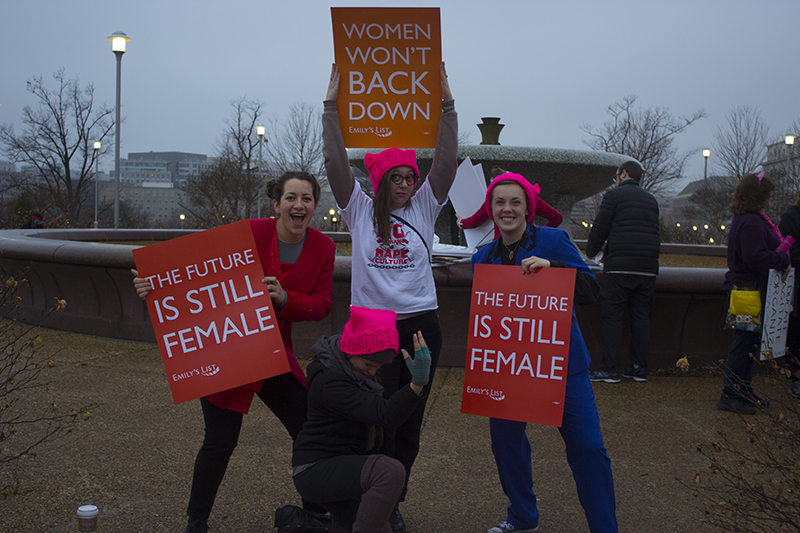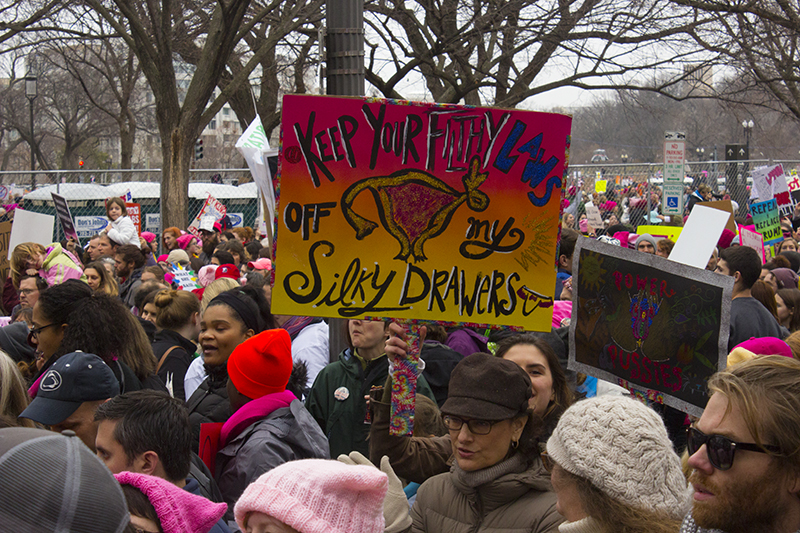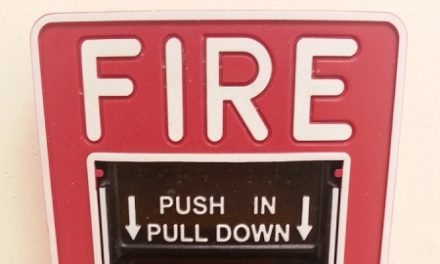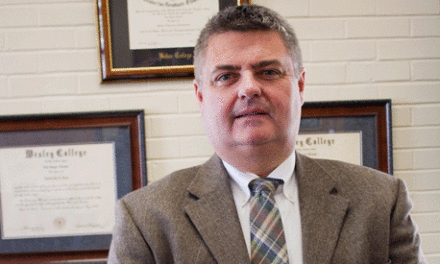By Kristen Griffith, The Whetstone
Junior Betty Lee put on her blue pantsuit and pink “pussy hat†before she joined dozens of other pussy hat wearing women chanting, “We don’t want your tiny hands anywhere near our underpants,†on the Washington DC metro train.
“I’m wearing the pantsuit for Hillary Clinton because I think she should be the one leading the country right now, and she fought a lot of hard battles in a pantsuit,†Lee said.
The Student Government Association was unable to provide busing to the women’s march Jan 21 in Washington DC, but that did not stop the handful of Wesley students and faculty from attending Jan. 21. They joined the half-million people in the streets of Washington to protest the new President of the United States, Donald Trump.
Senior Kenny Ciccoli was one of the few men from Wesley to attend the women’s march.
“Despite the titles, there’s a certain commonality with all people,†he said. “This is really just about people coming together.â€
Thousands of signs floated above the crowd: “Fund more environmental research,†“F**k your wall,†“Super callous-fascist racists extra braggadocious†and “Keep your filthy laws off my silky drawers,†with a colorful uterus drawn at the center.
Dr. Linda De Roche, English professor, who also attended, said her favorite chant was, “This is what democracy looks like.â€
“Democracy is messy,†she said. “It is chaotic. It takes work. It’s a difficult thing to do and it involves protest.â€
De Roche said she had to attend.
“I’m absolutely aware how fragile the gains the women’s movement made in the 1970s are,†she said.
De Roche said her students and the generations after her might not know the fragility of their rights.
“You’ve grown up with reproductive rights, you’ve grown up with Planned Parenthood, the ability to have access to birth control information and healthcare,†she said. “You’ve grown up with Title IX and EEOC (Equal Employment Opportunity Commission) laws. I didn’t.â€
Freshman Shenandoah Lush said the community of activists moved her.
“Despite the incredible mass of people, I felt so at peace with the powerful, informed and seriously kick-ass individuals that I was lucky enough to have marched with,†she said.
Protesters stood shoulder to shoulder as they waited for the march to start at 1:15 p.m.
An hour and a half later, people still hadn’t moved.
“I got on my boyfriend’s shoulders to see if there was a way forward toward the start of the march, and all I could see was a sea of pink hats, pride flags, banners and chattering folk,†Lush said.
She used the time to reflect on why she was there.
“We, the mainstream feminists, need to work harder to invest intersectional feminism (the brand of feminism that addresses the oppression of all women) into our national dialogue,†Lush said. “We need to listen, and we need to be there when our privileges do not align with the rest of our family.â€
Senior Shaylynn Bivens said she was inspired to watch people support the rights of all women.
“I witnessed white people admit to their privilege and denounce it or use it to help minorities in our battle to gain civil rights,†she said. “Hearing white women proclaim wholeheartedly that black lives do matter was everything to me.â€
After chanting “Let’s march now,†people started walking into free space and created their own routes.
“Now we’re on our way to the White House,†Remy Barrows-O’Neal from Boulder, Co. said. “I love that this group wants to move. Everyone wants to hold a sign, say what it is that they want to say and move around.â€
Not everyone made it to the White House.
“My Alaskan group stopped marching around 1300 Pennsylvania Avenue in order to tackle the metro lines,†she said.
Bivens said she was able to make it to 1600 Pennsylvania Avenue and described the march as “overwhelmingly beautiful.â€
“Being around millions of individuals from many different backgrounds, religions, cultures, races and sexual orientations was such an amazing feeling,†she said. “Aside from all our differences, we share the same struggle and are working for the same cause.â€
Lush said those who weren’t able to attend can still contribute to the movement.
“Speak up,†she said. “Recognize systematic prejudice in our city, state and nation. Understand your privilege, and utilize it to empower others.â€
De Roche said she’s never been in a group that large.
“I’ve never had such a feeling of sisterhood, joining in with something that matters,†she said. “I’m so glad I went.â€







